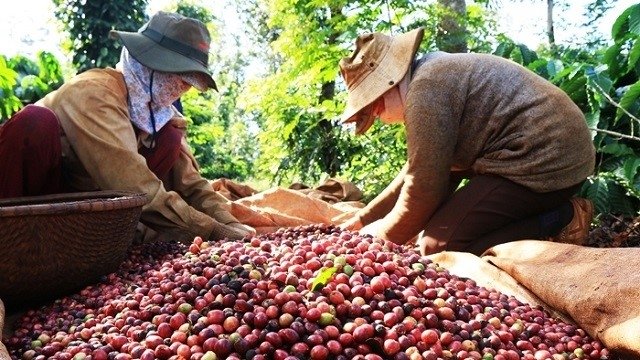
As the world's leading producer of coffee, it is important to promote branding, value-added increases and global value chain participation for Vietnamese coffee, experts have suggested.

Multiple solutions are needed to improve the quality of Vietnamese
coffee.
According to the General Department of Customs, for the first
nine months of 2018, Vietnam’s
coffee exports reached over 1.4 million tonnes, valued at US$2.75 billion, up
18.8% in volume.
Germany and the US continued to be the two largest
consumer markets for Vietnamese coffee in the first eight months of 2018, with
market shares of 12.6% and 9.8%, respectively. Other markets with a sharp
increase in the imports of Vietnamese coffee in the first eight months this
year included Indonesia (+ 8
times), Russia (+ 66.6%) and
Philippines
(+ 46.6%).
However, global demand and coffee prices
have a direct impact on domestic coffee prices. The average coffee export price
in the Jan-Aug period was down 15.5% over the same period in 2017, reaching
US$1,913 per tonne.
In September, unroasted robusta coffee in
Vietnam’s Central
Highlands decreased by VND700 a kg to VND31,900 - 32,500 per kg,
compared with the previous month. During the first nine months of 2018,
domestic coffee prices fluctuated sharply with the fall ranging from VND 2,100
- 2,400 a
kg.
The fluctuations in the world market
causing impacts on the domestic market are inevitable. However, experts have
shown how to reduce these impacts to the maximum. Tran Van Hung, from Fair
Trade Project in Vietnam,
suggested that besides ensuring the quality of coffee, it is important to
promote the participation of Vietnamese coffee in international certification
on fair trade or sustainability, in order to have a stable coffee price in the
world market and ensure an income for farmers.
"When these certificates are
available, each price movement on the world market ensures that farmers are
still able to sell their coffee at a minimum price. This price guarantees that
farmers growing coffee will have profit to reinvest," Hung said.
Dao Duc Huan, Director at the Centre for
Rural Development (under the Institute
of Policy and Strategy
for Agriculture and Rural Development), said that in the face of market demand,
it is necessary to promote advantages and determine the appropriate strategy
and long-term approach for Vietnamese coffee to affirm its role and position.
In particular, building a high-quality Vietnamese coffee brand is an important
solution and is the basis for promoting effective and sustainable value chains
for Vietnamese coffee products in the future.
To realise this goal, in addition to support
from the State in accessing market demand information, it is essential to
develop synchronous policies and solutions to promote and introduce coffee
products aimed at raising the image of Vietnamese coffee in the world market,
contributing to raising its value and promoting market expansion in the context
of deeper international economic integration.
Source: NDO
Since the beginning of this year, under the direction of the Department of Agriculture and Environment, the Sub-Department of Agricultural, Forestry, and Fishery Product Quality Management has strengthened the integration of the professional activities to promote and guide the organizations and individuals in the production and trading of agricultural, forestry, and fishery products to comply with the legal regulations regarding the use of chemicals, pesticides and veterinary medicines in crop cultivation, livestock farming and aquaculture. They also provide guidance to processing and manufacturing establishments on keeping the records to trace the product origins and using food additives from the approved list according to the regulations.
Hoa Binh province saw a significant rise in state budget revenue in the first two months of 2025, heard a meeting chaired by Vice Chairman of the provincial People’s Committee Quach Tat Liem.
Ha Thi Ha Chi, a 26-year-old graduate in law, has taken an unconventional path by returning to her hometown in Mai Chau district to establish the Tong Dau Cooperative, creating stable jobs for local women and bringing Thai ethnic brocade weaving to the global market.
As the Lunar New Year 2025 approached, pork prices surged, creating a profitable season for farmers in Tan Vinh commune, Luong Son district. Taking advantage of the rising demand, Can Minh Son, a farmer from Coi hamlet, sold over 30 pigs at 69,000 VND/kg, each weighing more than 100 kg. After deducting expenses, his family earned a profit of over 50 million VND.
alternate member of the Central Party Committee, Secretary of the Hoa Binh provincial Party Committee Nguyen Phi Long on March 5 had a working session with Yan Jiehe, Founder and Chairman of the China Pacific Construction Group, one of China's largest private corporations in the field of transport infrastructure. Deputy Secretary of the provincial Party Committee, Chairman of the provincial People's Committee Bui Duc Hinh and leaders of provincial departments and sectors also attended the working session.
The electronic printed circuit board (PCB) manufacturing and processing plant of Japan’s Meiko Group, located at Da River Left Bank Industrial Park in Hoa Binh city with a total investment of over 200 million USD, is expected to create thousands of jobs and make a significant contribution to the local budget.



